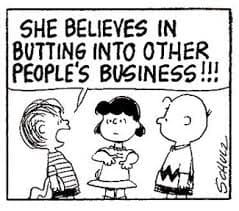It’s long been established that the shortest distance between two points is a straight line.
Why then, do so many leaders beg to disagree?
If not, how to explain the prevalent leadership practice of inserting oneself (loudly and with much fanfare, in some cases) squarely between Point A and Point B, when there is absolutely no need to do such a thing and when doing such a thing is inefficient, cumbersome, and awkward?
Have you dealt with this?
I’m talking about:
- Making decisions others are paid to make.
- Appointing yourself as liaison for parties capable of communicating with each other just fine without you.
- Assigning yourself as a “de facto” project manager after you’ve already delegated the project to a project manager.
- Usurping other managers’ authority by directly delegating work to their staff, undoing their decisions, and otherwise making it very clear that you’re the only manager who counts.
(I once worked with an Executive Director who’d send emails to all staff prior to every out-of-town business trip saying that, while she was away, the Directors would be in charge.
You don’t say? Well, who the heck is “in charge” of the Directors’ staff when you’re here? Oh, I see…)
The meddling manager
Theodore Roosevelt is credited with saying:
The best executive is the one who has sense enough to pick good men to do what he wants done, and self-restraint to keep from meddling with them while they do it.”
“Meddling” is an excellent way of describing the situation.
“Med-dle (v.) To interfere in or busy oneself unduly with something that is not one’s concern.” (Google)
Please stop it, leader. Push some power down and permit your managers to push some power up. In fact, you should allow all employees as much authority as they can handle.
(Seriously, what kind of workplace won’t even make room for employees to reach their level of incompetence?)
Meddling versus micromanaging
Both meddling and micromanaging are about control, but they’re not the same.
Micromanagers need to be in control and to be obeyed. (Yuck.)
 Meddlers, on the other hand, need to be needed, and they sincerely believe they know best. (The micromanager doesn’t give a hoot about being needed or right. “Just do what I say! I don’t care if it’s wrong.”)
Meddlers, on the other hand, need to be needed, and they sincerely believe they know best. (The micromanager doesn’t give a hoot about being needed or right. “Just do what I say! I don’t care if it’s wrong.”)
However, both types are problematic. Both cause their employees to feel redundant, frustrated, and eventually, resentful. Many under their charge will tire of beating their heads against a wall and instead mentally check out before moving on. And they should. The alternative is decidedly unhealthy.
Oftentimes meddler leaders have been with their companies for years — perhaps since the beginning, even — and their over-involvement could almost be forgiven, because it’s understandable.
Still, meddling stumps the growth of workers and organizations. As such, mindful leaders will take pains to, as Roosevelt put it, exercise self-restraint and let their managers manage.
How to stop the madness! (Er … meddling)
It’s not easy to change bad habits, but it can be done if the leader is willing to:
- Be open to feedback. For every meddling leader, I guarantee you that someone, at some time called the leader on his or her stuff. That Executive Director with the email addiction I mentioned earlier? She once hired a consultant who told her she was entirely too involved in her managers’ business. The ED’s response was to fire the consultant.
- Pay attention to the signs. Low morale, high levels of conflict, and high voluntary turnover (especially among senior leadership) is a big red flag that some-thing is amiss with leadership. Everybody can’t be a bad apple.
- Get some help. What executive doesn’t need a coach? A rare one. Leadership is tough, and it’s getting tougher all the time.
- Focus on the benefits of having a “big ego, little ego.” In How to Get a Job at Google, Laszlo Bock discusses the concept of having an ego big enough to speak your piece but little enough to respond positively to new ideas and new in-formation.
What you’ll gain by stopping the meddling
The pay off for making the change is enormous, including:
- A stronger, healthier, and more resilient organization.
- More engaged and productive employees.
- Less workplace conflict.
- Less bad turnover.
As a bonus, imagine how much you could accomplish if you weren’t doing everyone else’s job?
